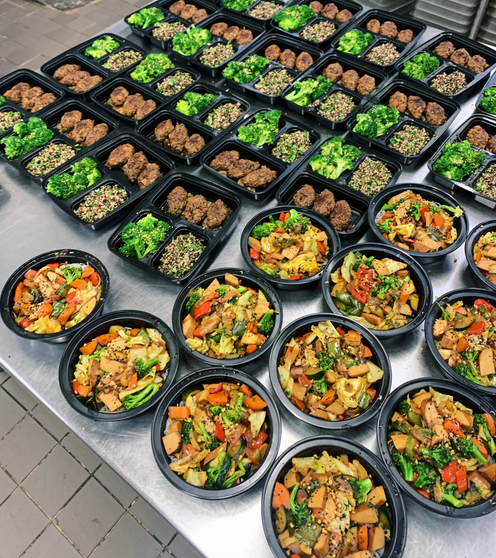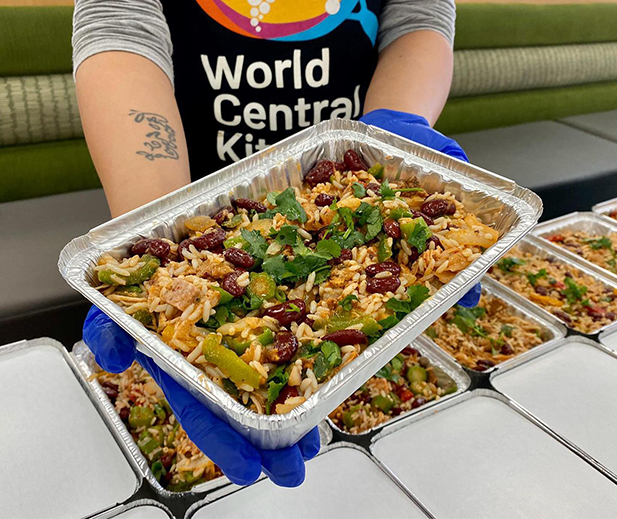For health care professionals on the front lines of the COVID-19 pandemic, good nutrition is as much a part of “PPE” as N95 masks, and can be just as difficult to obtain.
How and what should medical care givers — and the rest of us—be eating at this critical time? How can we support and strengthen our immune systems through what we eat?
Vitamin D, turmeric, elderberry—these are among the numerous nutrients and botanicals being promoted as helpful for preventing or treating COVID. While some of these are reasonable for general good health, any claims regarding efficacy against Coronavirus is anecdotal or extrapolated from very limited basic research.
It’s been impossible for researchers to keep pace with the rapidly emerging data about the pandemic, and “[i]n the absence of large-scale and long-term data, there is insufficient understanding of the subtle differences of specific nutrients on outcomes for individuals and populations,” says The American Nutrition Association . “The nutritional strategies to deal with this infection are only supportive.”
Keeping Medics Healthy
While there is no nutraceutical silver bullet for COVID, there is a nutritional gold standard — the Mediterranean Diet. Not only is it one of the most studied diets, it’s also the most popular. Prior to the pandemic outbreak, the Mediterranean Diet was named Diet of the Year for the third year in a row. There’s good reason for that trend to continue.
The Mediterranean Diet has been linked to improved lung function, and lungs are what Covid-19 targets.
Along with other holistic dietary approaches including macrobiotics, Blue Zones, the DASH diet and a whole foods plant-based diet, the Mediterranean Diet prioritizes a rainbow of fresh produce, beans, whole grains like barley and oats, healthy fats like avocado, nuts, and extra-virgin olive oil, and encourage the use of spices, not salt.
Spices like turmeric, ginger, chili peppers, cinnamon, even cacao—though not traditionally “Mediterranean” will brighten the palate and naturally reduce inflammation. There’s some evidence the flavanoids and compounds in these foods have served to help boost immunity to prior viruses and infections, including SARS, though there is not yet any documentation regarding their impact on COVID-19.
There are a lot of unknowns about what foods would help the body fight this virus. But it is clear what sort of foods don’t help.
As ever, processed food —simple carbohydrates, foods high in added sugar, fried foods, and processed meats — are all tied to increased inflammation and raise risk for a myriad of chronic diseases. They further stress immune systems already threatened by exposure to the coronavirus.
Yet they’re what people tend to turn to in times of stress. They’re prevalent in hospital vending machines and cafeterias. For many people working in hospitals, they’re the only convenient options.
Compounding the problem is that few US hospitals were serving the healthiest options back when life was normal. Now, in response to COVID, many have closed or limited their food services to avoid further viral spread.
Restaurants Step Up
In many cities, the restaurant industry is stepping up to try and fill the nutritional void on the pandemic’s frontlines.
 COVID-19 has limited restaurants to takeout and delivery service only. Some have shuttered entirely. But many restauranteurs are keeping themselves and their staff busy by pivoting to feed health care workers.
COVID-19 has limited restaurants to takeout and delivery service only. Some have shuttered entirely. But many restauranteurs are keeping themselves and their staff busy by pivoting to feed health care workers.
Leading the charge, Chef Jose Andres has mobilized his nonprofit World Central Kitchen and has been preparing 250,000 free meals per week for hospital workers in New York and Los Angeles.
Andres is the co-owner of the ThinkFood group, which operates 35 healthy Mediterranean, Mexican, and Asian-fusion restaurants across the country. He has turned eight of the NYC and Washington, DC restaurants into free soup kitchens. Andres was also able to negotiate an arrangement with the Washington Nationals to use the team’s Nationals Park stadium as a massive kitchen and distribution center for his massive COVID relief operation.
A firm believer in paying it forward, Andres and his World Central Kitchen had previously provided free meals to families affected by the 2010 earthquake in Haiti, Puerto Ricans affected by Hurricane Maria, and those displaced by many storms, wildfires and other natural disasters here in the US and abroad.
Across the country, many other restaurants large and small are delivering free — and contact-free — meals to health care workers.
Communities are stepping up to make sure their local health care workers get at least one good meal a day. In cities including Los Angeles, New York and Miami, people are innovating, launching regional GoFundMe campaigns and donating to nonprofits to keep restaurant staff employed, cooking, and delivering food to health care and hospital workers.
ProMedica health care, which serves parts of Ohio and Michigan, has mobilized pop-up groceries at affiliate  hospitals, so hospital staff can stock up on supplies.
hospitals, so hospital staff can stock up on supplies.
There’s even instances of small scale (but big hearted) efforts like a Vermont women who donated her gift card to a local barbecue joint to feed staff at her local hospital.
Nutrition On-the-Go
But for many physicians, nurses, and other medical professionals working long hours under hazardous conditions, access to these options remains limited.
Fortunately, though, many healthy, tasty, nutrient-dense foods come as ready-to-eat “grocery grab” options:
Nuts, especially walnuts, are very high in omega-3s. Nut butters are all high in protein, fiber, and healthy fats. Some brands of nut butters, including //shop.justins.com/Nut-Butters/c/Justins@NutButters“>Justin’s, are solid in individual squeeze packs, as are some brands of seed butters (sunflower, pumpkin, etc). Brands like Once Again offer some excellent seed butter alternative for those with tree nut allergies.
Mushrooms, long touted for their healing properties in both TCM and Ayurveda, come dried and spiced in jerky form to slip into a bag or back pack and eaten on the go.
Dates: Naturally sweet and rich in potassium, iron and fiber, magnesium, and potassium, dates digest easily without creating blood sugar spikes. Dried dates need no refrigeration, can be enjoyed by themselves, and also feature as a primary ingredient in many brands of minimally processed energy bars including Larabars.
Fermented foods: Fermented foods create colonies of beneficial bacteria in the gut, which can boost immunity. Kimchi, sauerkraut and tempeh are naturally probiotic rich. So are most yogurts, which provide a much more convenient on-the-go option than the aforementioned fermented vegetables. Most popular yogurt brands are sold in small-portioned cups. Choose a no-sugar, or lower-sugar brands with live cultures, like Chobani . Skip the ones with cookies and other mix-ins.
Beans: Nutritious and fiber-rich, beans are the foundation of many healthy diets, worldwide. Hummus, widely available in on-the-go convenience packages, gives you the fiber and protein of chickpeas with the zinc and iron from sesame tahini. It is tasty and satisfying, and can stave off hunger for long periods, while balancing blood sugar.
But chickpeas aren’t the only bean-based option for front-line clinicians trying to stay healthy. Better Bean offers a variety of non-GMO, preservative-free, bean dips in convenient tubs.
Chocolate: Cacao, or raw chocolate, has anti-inflammatory properties and heart-healthy antioxidants. The darker the chocolate, the higher the antioxidant delivery. Dark chocolate with 70% or higher pure cacao, absent a surplus of added sugar and fat, delivers the same thing, along with a healthy dose of comfort and pleasure. Dark chocolate can also play a role in stress reduction, according to researchers at Loma Linda University. Consumed in moderation, dark chocolate’s not a bad thing. Better-for-you brands include Endangered Species and Alter Eco.
Some good takeaway or delivery options include:
Green Smoothies: When blended to include leafy greens like kale and spinach, smoothies provide a fast, filling liquid meal of fresh fruits and vegetable with all their phytonutrients and fiber intact. Fresh juices, on the other hand, lose the fiber and with it, some of the phytonutrients.
Whole Grain Bowls: Brown rice bowls or quinoa bowls are available for takeout and delivery at many fast-casual restaurants. Topped with vegetables, beans for protein and fiber, salsa for lycopene, and guacamole for flavor bowls provide hearty and healthy all-in-one quick meal. Cheese can add calcium and protein.
There are so many unknowns and so much misleading information about the novel coronavirus and the pandemic it has caused. But we know that a good diet is the foundation of overall health, and the Mediterranean Diet has some reliable science behind it. This proven way of eating may be the one thing healthcare workers — and the rest of us — can rely upon.
END







